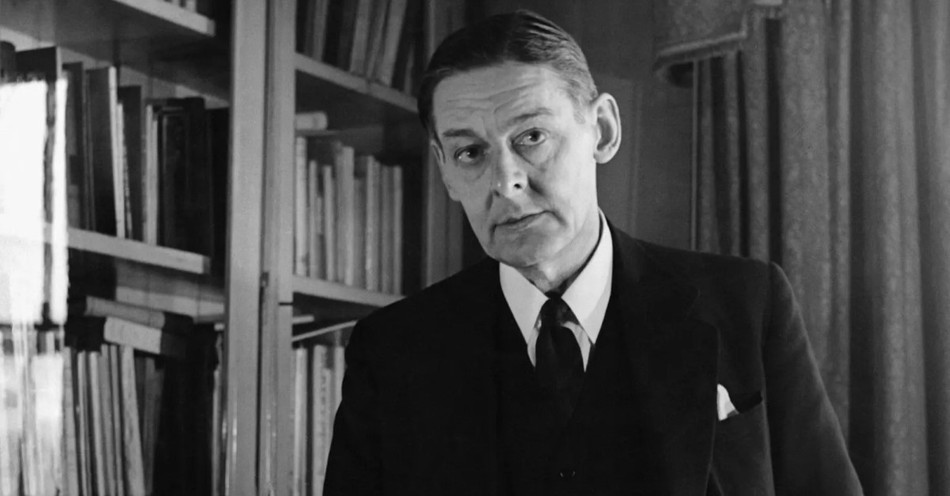One of the twentieth century’s most important poets was T.S. Eliot. The American-English poet emigrated to England, where he had a great literary career, eventually receiving the Nobel Prize for Literature. Little did he know that he would become one of his day’s most important and influential poets, inspiring many great Christian writers. How did this come about?
10 Important Events in the Life of T.S. Eliot
1. Eliot is born in St. Louis, Missouri, in 1888.
2. Eliot meets Emily Hale in 1912.
3. Eliot’s first professionally published poem, “The Love Song of J. Alfred Prufrock,” appears in 1915.
4. Eliot marries Vivienne Haigh-Wood in 1915. They will separate in 1933.
5. Eliot’s “The Waste Land” is published in 1923.
6. Eliot becomes the literary editor for Faber & Faber in 1925.
7. Eliot becomes a British citizen in 1927 and converts to Christianity.
8. Eliot’s The Four Quartets is published in 1941.
9. Eliot wins the Nobel Prize for Literature in 1948.
10. Eliot marries Valerie Eliot in 1957. They will stay married until his death in 1965.
What Can Christians Learn from T.S. Eliot?
Christians can learn from T. S. Eliot’s example that no matter how dark things seem in the world, the agape love of Christ triumphs over evil, sustains us, and gives us hope in the here and now; what is to come in the New Jerusalem. Eliot lived through the darkness of WWI and WWII but did not despair because of his hope in Christ. This is the hope that the world seeks.
T. S. Eliot responded to the darkness of the war years by writing poetry. He needed to find the words to help him come to grips with the darkness in the world, in himself, and be reminded of a good and loving God continually making all things new. He was honest about the terrible ramifications of war on so many lives—the food rationing, the families separated, the desecration of cities, towns, villages, and people suffering from trauma. Yet amid that terrible existential darkness, many people still believed, despite their doubts, that Christ was present. That hope in Christ kept Eliot going.
Another important thing Christians can learn from Eliot is how flawed human beings are and how much we need God’s unmerited grace. During Eliot’s first marriage to Vivienne Haigh-Wood Eliot, he was emotionally involved with Emily Hale, an old flame from Harvard University. Correspondence between Eliot and Hale went on for years and surfaced in January 2020, revealing that Hale was Eliot’s poetic muse.
Eliot’s first marriage proved difficult due to Vivienne’s struggles with mental illness. They separated in 1933, and five years later, Vivienne’s brother Maurice had her committed to an insane asylum. Vivienne lived there for the rest of her life. Eliot never visited her. Eliot ultimately didn’t marry Hale after his first wife died, instead marrying Esmé Valerie Fletcher in 1957.
While it’s not impossible to sympathize with Eliot seeking emotional comfort from Hales when his first marriage spiraled into disaster, the situation doesn’t make his actions right. Some writers have questioned whether he was selfish not to marry Hale after years of anticipation. Humans are complex and flawed. Even talented humans following Christ are capable of sinning as the rest of us.
Fortunately, both Eliot and Hale went on to have successful lives. Eliot’s marriage to Esmé Valerie Fletcher lasted until his death and was by all accounts a happy one. Hale had a successful teaching career in Massachusetts, followed by a successful career in community theater.
Was T.S. Eliot Connected to the Inklings?
Although T. S. Eliot wasn’t part of the Inklings literary circle at Oxford, he was very close friends with one Inkling, Charles Williams. Eliot found Williams’ fantasy novels, such as The Place of the Lion, fascinating. His publisher, Faber & Faber, would later publish two of Williams’ novels (Descent into Hell, All Hallows’ Eve). Eliot also appreciated Williams’ conversation—Williams had an immense knowledge of Dante, Milton, and other great poets.
Williams is usually considered one of the four major Inklings, though C.S. Lewis and J.R.R. are the most famous. While Lewis was a literature scholar, he didn’t sympathize with modern poetry, particularly not Eliot’s work. To some extent, this may be because it didn’t fit Lewis’ specialty. He taught various classes at Oxford and Cambridge but specialized in medieval texts, like Beowulf and The Canterbury Tales. Lewis’ scholarship is still acclaimed today—his first published scholarly book, The Allegory of Love, appeared in 1936 and is still used for medieval studies at schools worldwide.
It’s also possible that Lewis was jealous of Eliot’s fame since Lewis had much less success with his poetry. Lewis published two volumes of poetry—Spirits in Bondage in 1919 and Dymer in 1926. Though some Inklings, like Owen Barfield, appreciated Lewis’s poetry, neither book received huge acclaim or sales. Lewis’ fame came from many other works (his Narnia books, his literary criticism, his theology works) but not poetry, alas.
The literary rivalry between Lewis and Eliot lasted for many years. They met in person for the first time in 1945 at the Mitre Hotel in Oxford. Williams arranged the meeting, but it didn’t go as he had hoped. Eliot remarked to Lewis that he looked older in person than in pictures Eliot had seen. Lewis was hospitable but not amused.
Despite their different opinions on poetry, Lewis and Eliot shared a love for literature, myth, and liturgy. They ended up reconciling later when they both worked on the Revised Psalter commissioned by Geoffrey Fisher, the Archbishop of Canterbury. The project started in 1958 and finished in 1963. During that time, Eliot and Lewis met at The Lambeth Palace in London and various places in Oxford. The meetings birthed a cordial correspondence that allowed them to become friends.
What Did T.S. Eliot Write about Christianity?
In 1949, Eliot’s book called Christianity and Culture was published. The book was based on lectures he gave at Cambridge University in 1939. In his second chapter, Eliot describes art’s importance in the Christian worldview. He argues that art should not be used in a utilitarian way, a means to mere profit. Instead, the artist’s role in society is to raise honest questions and be honest about the darkness in the world while also conveying the hope found in Christ. Eliot glorified God in his literary career by passionately pursuing his vocational calling.
What Can Christians Learn from Eliot’s Approach to Poetry?
Eliot broke away from the traditional rhyme scheme form of poetry by writing free verse. He belonged to the modernist literary movement along with Ernest Hemingway, James Joyce, Sylvia Beach, F. Scott Fitzgerald, and Virginia Woolf. Eliot was part of this modernist literary movement, but he was still influenced by great poets like Dante, John Milton, and John Keats.
Eliot saw poetry as an incarnational activity requiring an act of surrender. This act of surrender glorifies God with the gift that you have by cultivating it. This sacramental view encourages Christians not to be discouraged about not being good enough or not being as good as the greats. Rather, Christians should use their artistic gifts, whether poetry, music, painting, acting, writing, or dance, to the glory of God. How can this be done? By cultivating the craft every day. By building off of artistic influences for creative inspiration and encouragement. By finding friends who can critique your work and offer helpful, constructive criticism.
Who Are Some Christian Writers Influenced by T.S. Eliot?
Eliot has influenced many modern Christian writers. Writers he has influenced include songwriters like Jon Foreman, novelists like Frederick Buechner and Madeleine L’Engle, priests like Thomas Merton and Tish Harrison Warren, and memoirists like Donald Miller. Each of these particular writers found Eliot’s work gave great spiritual nourishment while writing about the theological virtues of faith, hope, and love in a fallen world. These writers have immensely encouraged my faith journey and helped me find my writing voice.
10 Great Books by T.S. Eliot
These are some of Eliot’s best works, from plays to poetry to theology.
2. The Rock
3. The Waste Land And Other Poems
5. The Love Song of J. Alfred Prufrock
6. To Criticize the Critic and Other Writings
7. Old Possum’s Book of Practical Cats
10 Great Books on T.S. Eliot
These books look at Eliot’s life from a variety of angles. Some discuss his writing while others discuss his life. They all give a better look at this talented, complex man.
1. The Art of T.S. Eliot by Helen Gardner
2. T.S. Eliot: The Man and His Work by Allen Tate
3. Reluctant Allies: Essays on Eliot and the Inklings edited by Ken Woodington
4. The Imperfect Life of T.S. Eliot by Lyndall Gordon
5. The Invisible Poet: T. S. Eliot by Hugh Kenner
6. Understanding Four Quartets as a Religious Poem by Michael Spencer
7. Eliot After “The Waste Land” by Robert Crawford
8. Religious Quest in the Poetry of T.S. Eliot by Caroline Phillips
9. The Hyacinth Girl: T.S. Eliot’s Hidden Muse by Lyndall Gordon
10. T.S. Eliot’s Dramatic Pilgrimageby Daven Kari
If You Enjoyed this Article, You May Enjoy the Following:
Tolkien, Eliot, and the Power of the Story: Don't Lecture, Inspire
The Life and Work of C.S. Lewis
What Did C.S. Lewis' Brother Warnie Lewis Do?
Why Did C.S. Lewis Call Christianity a True Myth?
50 Great Books on Christian Art
10 Things You Need to Know about J.R.R. Tolkien
Forgotten Christian Fantasy Pioneer Robert Siegel
Photo Credit: Getty Images/Hulton-Deutsch Collection
Justin Wiggins is an author who works and lives in the primitive, majestic, beautiful mountains of North Carolina. He graduated with his Bachelor's in English Literature, with a focus on C.S. Lewis studies, from Montreat College in May 2018. His first book was Surprised by Agape, published by Grant Hudson of Clarendon House Publications. His second book, Surprised By Myth, was co-written with Grant Hudson and published in 2021. Many of his recent books (Marty & Irene, Tír na nÓg, Celtic Twilight, Celtic Song, Ragnarok, Celtic Dawn) are published by Steve Cawte of Impspired.
Wiggins has also had poems and other short pieces published by Clarendon House Publications, Sehnsucht: The C.S. Lewis Journal, and Sweetycat Press. Justin has a great zeal for life, work, community, writing, literature, art, pubs, bookstores, coffee shops, and for England, Scotland, and Ireland.
This article is part of our People of Christianity catalog that features the stories, meaning, and significance of well-known people from the Bible and history. Here are some of the most popular articles for knowing important figures in Christianity:
How Did the Apostle Paul Die?
Who are the Nicolaitans in Revelation?
Who Was Deborah in the Bible?
Who Was Moses in the Bible?
King Solomon's Story in the Bible
Who Was Lot's Wife in the Bible?
Who Was Jezebel in the Bible?
Who Was the Prodigal Son?



